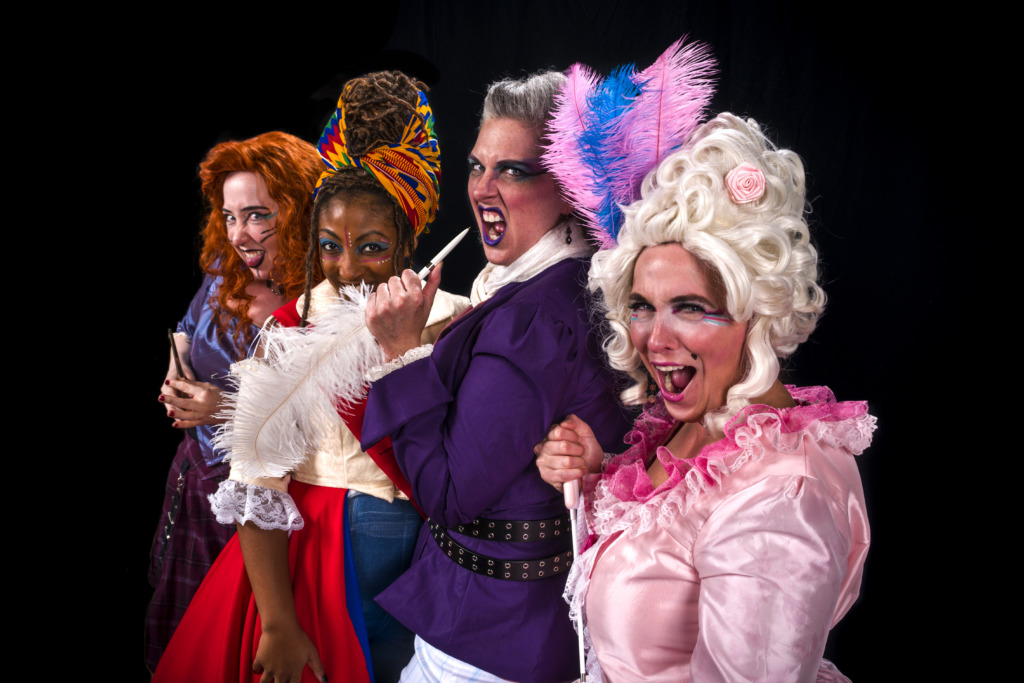Who are we without a story? Who are we without our power? Profound questions with moving answers, all of which will be explored in Lauren Gunderson’s The Revolutionists, now appearing live on-stage at The Colonial Players of Annapolis. Directed by Jennifer Cooper, this evocative dram-com (because it’s hardly a rom-com but it’s not exactly a dramedy and if Lauren Gunderson can invent words…) takes audiences back to Paris circa 1793 and delivers an outrageous series of interactions between four impossibly powerful women, giving voice to the revolution of the mind, the spirit, and the rights that belong to all women.
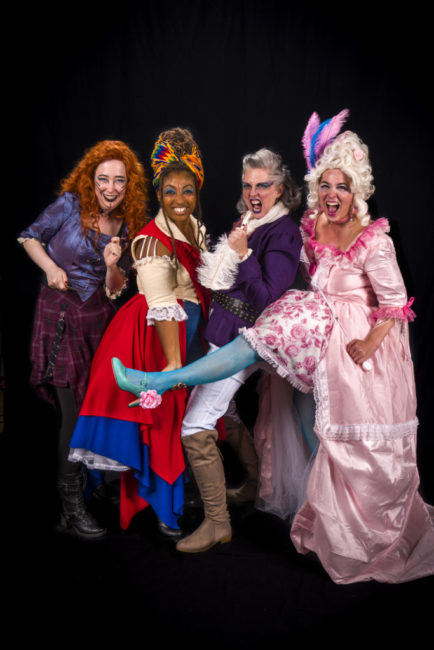
The infamous in-the-rectangle stage at Colonial Players appears deceptively simple at first glance when the audience filters in for the evening’s stage affair. There’s minimal scenery and space for some projections. Do not be tricked by Set Designer Richard Atha-Nicholls’ banal set. The minimalist approach broadens the horizons of the imagination as the play is a meta-mental-mind-warp from the word go. Atha-Nicholls’ focuses instead on bringing this ethereal element of ‘any time/any place’ to the scene, which lends itself to Gunderson’s work, which though designated for 1793 has an undeniable present-day flavor and verve to it. Atha-Nicholls’ putts projections to motion on one of the walls creating some spectacular visual effects particularly when it comes to the guillotine (which is like a fifth, unspoken character in Gunderson’s narrative) and various executions. The live-action-into-digital-action transition is impressive (take note when the Charlotte Corday character walks through a veil going from live to digitized in the blink of an eye like a well-conceived optical trick for a magic show.) The overall expression of scenic design and strikingly impressive video-digital-projection fits well within the bounds of Gunderson’s discombobulated chaos.
Sound Designer David Cooper brings a heightened experience to many of Atha-Nicholls’ scenic elements, particularly with the grizzly and gruesome sound of the guillotine. It is an aural displeasure that sends shivers up the spine and brings a note of finality and sobriety to the play, balancing out some of the more nonsensical comedy moments that are juxtaposed profusely if not arbitrarily throughout Gunderson’s script. But where Cooper really shines is with the comic callback elements of his sound design. As the play, which is a play within a play about writing a play, progressively evolves there are a series of ‘suggestions’ from the characters about how the play should/could be, most of which involve references to ‘being a musical.’ Cooper goes hog-wild with throwing blatant and hilarious sound bites of the iconic Les Miserables into the show on multiple occasions, garnering well-earned laughter from the audience (and ironic groans from the cast on stage!) Like fine thread, Lighting Designers Shannon Benil and Ginny White tie together the elements of scene and action, augmenting Atha-Nicholls’ set work in a similar fashion to Cooper’s sound design. The lighting is balanced, with one or two over-the-top moments to enhance hilarity or emotional gravity, and each in turn are executed with precision. The highlight of Benil and White’s illuminating work is the sultry red ‘mood’ lighting for the monologuing moment when Marie Antoinette is going off the rails about Thomas Jefferson in a hyper-sexualized rant.
Adding to the unique visual palette of this production, Costume Designer Amy Atha-Nicholls and Makeup-Hair-Wig Designer Leigh Rawls bring hints of late 18th century France and present-day pop culture to the production, fully capturing Gunderson’s mixed verve of “then and now but always relevant” the sartorial selection and overall style of the show. Marie Antoinette, one of four historical characters featured in the production, has the enormous pink gown of the 1790’s only it’s a high-low waterfall that showcases the electric-teal fishnets and sparkly matching sneakers in her front. Marianne Angelle (a historical composite character who is not one historical figure like the other three characters in this production but rather an amalgamation of many) wears a full period-style bustle skirt in the colors of the French flag, but also wears a stylishly modern midriff exposing half-cupped peasant top and a tropical island-colored headscarf. Atha-Nicholls gets this curious blend of 1790’s and 2020’s fitted to a tea on the four performers, with Rawls’ highly stylized wig and makeup selections— including the signature heart-kissy lipstick on Marie Antoinette— adding to the bizarre but aesthetically pleasing layout upon which the audience spends a little more than two hours visually feasting.
Director Jennifer Cooper keeps the play moving. Scene changes (not there is much with the exception of scattered papers and candles that appears to move about on the set between scenes) move quickly and the overall pacing of the show feels natural. If there’s fault to be had with the work in this production it falls mostly on the playwright’s convoluted script. Lauren Gunderson’s work vacillates between being a work of fiction writing itself, a work of history expressing itself creatively, a fourth-wall-busting entity that tries more readily to engage the audience than they are prepared for or even aware of, and the overall nature of what exactly is the play meant to be hanging in a perpetual state of confusion. There is some genius to be had in the constructive mess of what Gunderson has penned and the message, which is all too resonant in today’s present day, of freedom and equal rights for women is an important one.
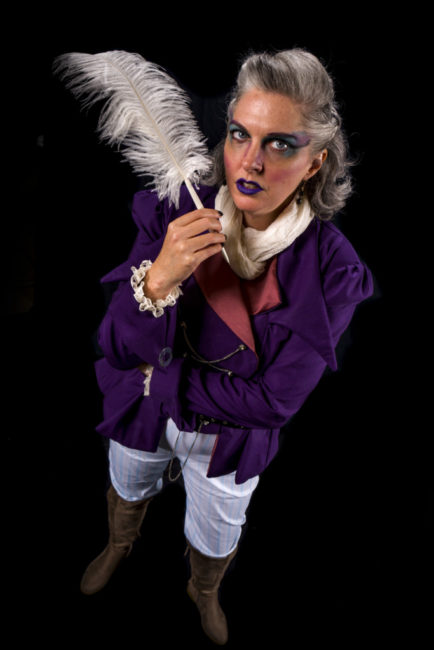
The four-person cast, under Cooper’s keen direction, move like one at times, whilst each holding their individualistic own. One could not be more different from the next and yet they all bear striking similarities to one another in one way or another. The play has a natural division line of “group scenes, duo scenes, and solo scenes”, giving each of the characters a moment to connect to and deeply interact with the others. It’s an impressive feat watching it all come together as one cohesive piece of theatre. Olympe de Gouges (Mary C. Rogers) is the initial touchpoint for the audience. She starts the play, blathering and babbling and working her way through her writer’s block, aloud. Rogers has a frenetic energy about her. She is constantly pacing, particularly when fear or anxiety soar to their peak in her performance, and there is a disquieted vibration that echoes throughout her entire physicality. One cannot reduce these characters to simple emotions, but if one could, one might say Rogers’ portrayal of Olympe de Gouges wholly embodies fear, nervousness, and uncertainty, which are quite often the attributes that accompany one in the face of life-changing revolution. Rogers is the actor that shows the strongest character arc progression. As the play progresses there are little shifts in the way the ‘playwright’ character matures, grows, and ultimately changes. She’s also quick with the disastrous tongue-in-cheek nonsense that Lauren Gunderson has penned into the character’s dialogue.
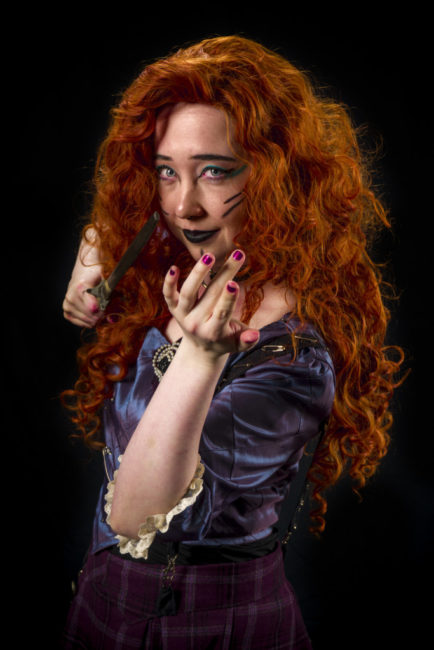
Crazy Charlotte Corday (Carey Bibb) is the fiery spirit of change. Bibb embraces the challenge of being the unbalanced and fully charged powder keg of revolution, storming into the scene, raging through each moment, and ultimately presenting a strong exterior when it comes to facing down the character’s conclusion. There is a delightful madness in Bibb’s eyes whenever assassination and things of the like are mentioned; this reads both comically and seriously and it’s an intriguing choice that gives a vivacious depth to the character. There is a heightened level of excitement, often reflected in the way she spews her lines at the other women on stage, that does not abate or cease, even when the tone of her overall delivery settles into something much heavier. Those moments are tempered with fits of maniacal glee, giving the Charlotte Corday character a bit more humor than she may have had in historical reality. Bibb, despite these more comically maddening moments, is not without her more sobering moments and it would be a sin against performing to say that she’s merely an incendiary spark waiting to burst. The traumatizing rant she gives when first seized is arresting in its own right, burbling over with fear and fury in equal parts. When the Charlotte Corday character heads to her end (it’s living history, not a spoiler), Bibb blinds the audience with her sobering calm; it presents a stunning contrast to her character’s otherwise edgy bounce.
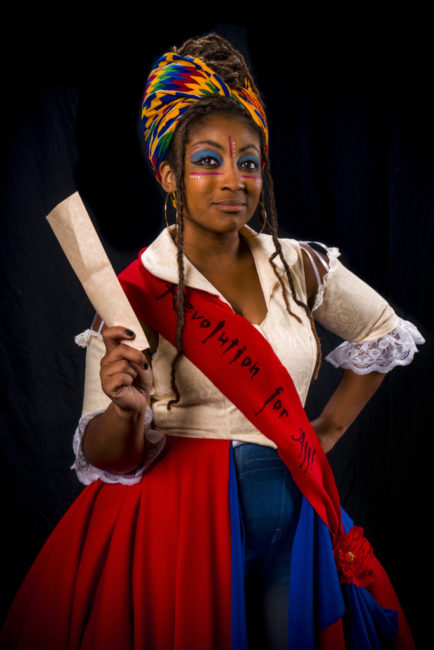
Marianne Angelle (Samantha McEwen Deininger), who is the only non-historical character in the production (she is a composite character based on the free black revolutionary women of then-Saint Dominque, now Haiti), is a steadying voice of reason who is bold, fearless, and burns with a progressive passion that is undeniably applause worthy. Deininger is riveting on stage, her mindful presence and presence of mind set the bar high for the other performers when it comes to standing the ground of one’s beliefs in this production. She wholly embraces the notion that this character, while existing in the historical confines of the play’s 1790’s, is a voice and personality that transcends time. There is a confidence in the way Deininger carries herself that speaks to generations of freedom throughout time, making her portrayal of the composite-character evocative, grounded, and hyper-realistic. Deininger delivers a veritable range of snappy one-liners, poignant advice, and heartfelt confessions. While the character is forward and at times aggressive, it isn’t until she digs her claws into Olympe, calling her out on being a coward, that the audience is treated to this raw and visceral moment, brilliantly showcasing Deininger’s extraordinary emotional range as a performer. The audience is also treated to Deininger’s exquisite vocal prowess near the end of the production when she sings a few ‘final words’.
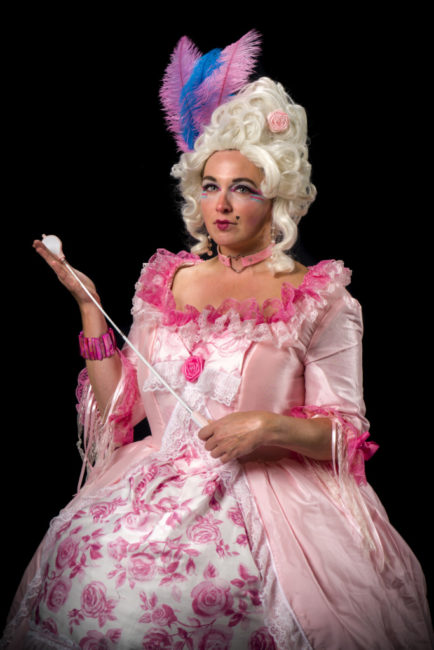
Marie Antoinette (Ryan Gunning Harris) is nothing short of an enigma. The flippant, albeit hysterical, attitude and antics imbued upon the character in Gunderson’s script are equal parts maddening and entertaining Harris has refined the execution of these character traits down to a delectable science, really creeping under the skin to irritate while simultaneously tickling the funny bone of the audience. It’s outrageous in every sense of the word and wholly impressive that one person can portray such an inexplicably divided character. Harris handles the over-the-top nature of Marie Antoinette with vigor and a flawlessly affected vocal delivery that really turns the audiences’ heads, though she is not without her balancing moments of sincerity. There is a shared moment between Marie and Marianne (Deininger), where— in homage reference to sound designer David Cooper’s choice to include Wicked in one of the many musical nods in this show— Harris’ ‘majesty’ character channels Glinda from that same musical and bends to a ‘mere human level’ of compassion and understanding; it’s quite touching. The true shocker is experiencing Harris’ confession towards Marie Antoinette’s end (again, history is not a spoiler.) This two minute verbal march of emotional gravity and sobering severity is stunning, serving in sharp contrast to the otherwise chimerical nature that Harris brings to the queenly character all throughout the performance.
While the ending, which shall not be disclosed, feels off-kilter, it seems awkwardly fitting as the production itself feels slightly askew right from the word go. That seems to be the playwright’s intent and The Colonial Players’ production of The Revolutionists has captured that well. If you can change the world and live to enjoy the change, that’s a win. And that’s the goal for these revolutionaries who existed far ahead of their times. Don’t miss your chance to experience bizarre and fantastical living history with some comedy and drama thrown in for good measure this fall with Colonial Players’ production of Lauren Gunderson’s The Revolutionists.
Running Time: Approximately 2 hours and 15 minutes with one intermission
The Revolutionists plays through October 2, 2021 at The Colonial Players of Annapolis— 108 East Street in historic Annapolis, MD. For tickets call the box office at (410) 268-7373 or purchase them online.
As of August 17, 2021, masks are required by all patrons inside the theatre at all times, regardless of vaccination status. Proof of vaccination status is not required at this time.

